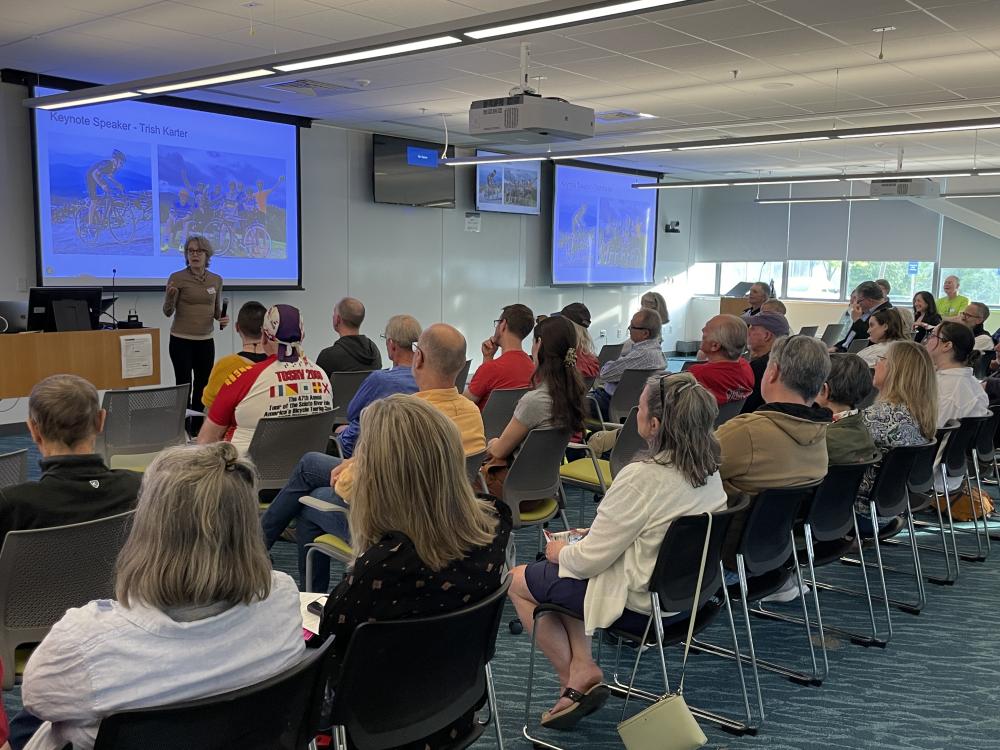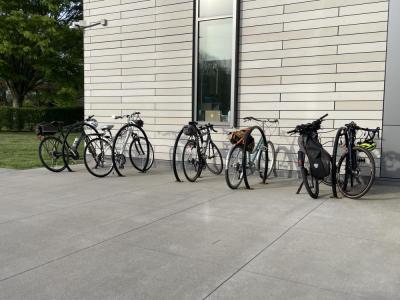Progress continues on South Coast bike path
To date, 17.41 miles of bikeways have been completed across Swansea, Somerset, Fall River, New Bedford, Fairhaven and Mattapoisett, with additional extensions in development, including right here in Dartmouth.
The Southcoast Bikeway Alliance’s efforts to realize a vision of connected multiuse paths stretching from Providence to Cape Cod is both “alive” and “well,” according to Sandra Medeiros, president of the Alliance, adding she has the residents to thank for much of that progress given their continued support and appreciation for the path’s value.
Trail advocates, local officials and community members gathered Tuesday, May 13, at UMass Dartmouth for the 11th annual South Coast Bikeway Summit, where leaders gave updates on ongoing and future bik epath projects and encouraged attendees to take action in support of the regional network.
One of the most significant projects in progress is the Northern Scenic Greenway — a proposed 10-mile shared-use path connecting Fall River and northern New Bedford. Westport, Dartmouth and New Bedford are currently transitioning from feasibility to design stages. A MassTrails grant, supplemented with matching funds from each community through the Community Preservation Act, is expected to receive a status update in June.
In preparation, the town of Westport is leading efforts to extend the South Watuppa Pond Trail and create a safe crossing at Route 6 using a 2024 MassTrails grant. The preliminary design includes a 12-foot shared-use path separated from Route 6 and a fully signalized crossing on Old Bedford Road near White’s of Westport and the adjacent hotels.
Also in progress are engineering designs for paths in Mattapoisett and Wareham. The Mattapoisett Shining Tides Mile, which opened in 2023, tripled summer bike and pedestrian traffic between Fairhaven and Mattapoisett, according to Medeiros.
Marion is set to begin construction of a 3.5-mile segment in 2026, further connecting towns in the region. Acushnet has formed a bike committee and envisions a path linking to Fairhaven. New Bedford is improving bike routes to its incoming train stations. The Massachusetts Department of Transportation has planned a new bicycle ramp exiting Route 6 west from the New Bedford-Fairhaven Bridge, addressing a long-standing safety concern.
“Every completed mile offers access to healthy recreation, safe, and environmentally friendly activities, commuter options and breathtaking natural beauty,” said Medeiros. “There really is a relationship between public support and progress. We've entitled this summit a ‘Call to Action’ because building the bikeway doesn't get done automatically and not quickly — as you know.”
She added, “The South Coast Bikeway Alliance is proud to be a long, strong, respected, regional voice to get this longstanding project complete. However, the public who use these paths and lanes must let elected officials in their municipal staff know that action is important.”
Attendees were encouraged to sign letters of support across 10 communities involved in the project.
The summit also featured a keynote address from Trish Karter, entrepreneur, activist and cyclist. A former Ride Across America team member, Karter is the founder of AGING STRONG, an initiative encouraging older cyclists, particularly women, to stay active and engaged in the sport.
Reflecting on her beginnings as a track runner in Connecticut during the first year of Title IX, Karter recalled joining the boys' team at around age 14. Efforts were made to push the girls to quit: “Almost everybody gave up — I didn’t,” she said.
Despite continued discouragement, Karter qualified for state meets but was unable to compete after her coach “forgot” to submit her paperwork. She said this experience ignited her interest in challenging inequality.
Karter later founded Dancing Deer Baking Co., which in 2009 donated 35% of its Sweet Home Gift line revenue to educational scholarships for at-risk mothers. That same year, she rode 1,500 miles solo from Atlanta to Boston, staying in homeless shelters along the way to raise awareness and advocate for solutions.
In 2010, after beginning competitive cycling, she suffered a severe crash during training that left her with both physical injuries and cognitive impairments.
“I thought, in addition to all the other things I had lost, I would lose my brain,” she said. “I knew that if there was a chance of getting out of that spot — I didn’t even think I’d be able to make a living — then, I would have to go after some really big audacious goal.”
That goal became climbing Mount Washington, which she says, “If you’re not pedaling, you’re going backwards.” Karter completed the climb in 1 hour and 50 minutes 18 months after her injury — and shaved 30 minutes off her time the next year.
Now, Karter advocates for age-graded performance metrics in competitive cycling. She continues to see fewer older women in the sport and wants to change both the perception and the structure.
“I can’t tell you how many of my own colleagues who are accomplished, competitive athletes, who say, ‘I don’t know. I’m just getting so slow. I don't have fun anymore.’ And they're actually not slow. They're oftentimes right on the top of the curve.”
She said she'd like to shift that mindset — and remove barriers that discourage aging athletes from continuing to ride.

















